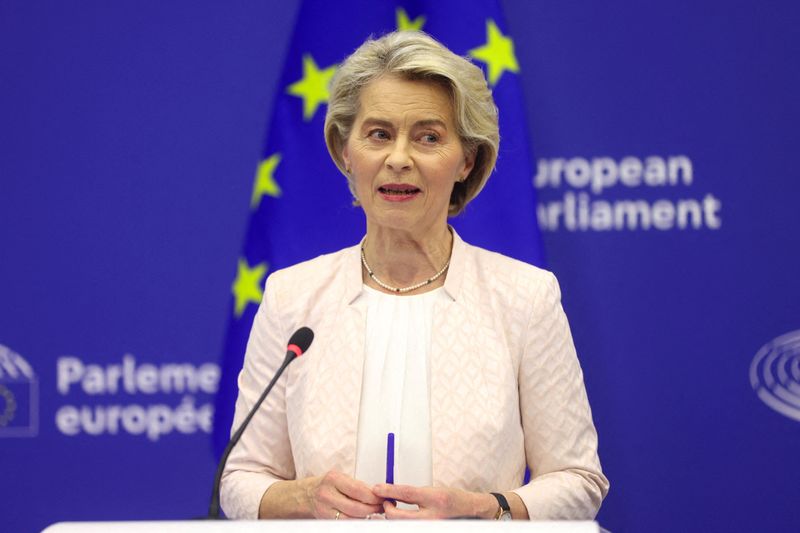By Ingrid Melander and Philip Blenkinsop
STRASBOURG, France (Reuters) – European Commission chief Ursula von der Leyen on Tuesday named a new team to lead the European Union’s most powerful institution for the next five years and tackle challenges to the region’s security, competitiveness and growth.
Reversing the 27-nation bloc’s lagging competitiveness, building up robust military manufacturing capacity and ensuring a fair transition to green energy will be key goals, the German conservative said.
Key appointments include Spain’s Energy and Environment Minister Teresa Ribera as the bloc’s new antitrust chief, whose job will be to rein in the power of Big Tech and ensure that the EU achieves its green goals.
With a record as one of Europe’s most ambitious policymakers on climate change, Ribera could intensify a crackdown against Big Tech led by outgoing antitrust chief Margrethe Vestager. She will also seek to ensure the EU’s single market is not distorted by companies benefiting from foreign subsidies.
“The whole college (Commission) is committed to competitiveness,” said von der Leyen, who this summer was handed a second term as EU chief executive by member states after her political camp won the most votes in the EU elections.
Climate change remains the major backdrop for EU policies, von der Leyen told a news conference. But, compared to her first term, security and competitiveness have become priorities too, she said.
Lithuania’s Andrius Kubilius will be the EU’s first defence commissioner, with the new role designed to build up military manufacturing capacity in the face of Russian aggression in Ukraine, next to the bloc’s eastern border.
The European Commission wants to set up a fund to support strategic sectors, a document showed, helping it compete in new technologies, especially against China and the United States.
The EU executive has the power to propose new EU laws, block mergers between companies and sign free trade deals.
All candidates will be quizzed by European Parliament lawmakers, who have to approve their nominations and will attempt to extract various commitments from the nominees at hearings expected in coming weeks.
Hungary’s Oliver Varhelyi is among the candidates EU officials expect to come under pressure during his hearing.
Each of the 27 member states will have one seat at the Commission’s table, a role comparable to a government minister, although its political weight varies greatly depending on the portfolio.
The appointment of the Commissioners is always the result of tough negotiations with member states and careful balancing of each country’s weight, party affiliation and gender.
The EU’s two biggest countries have top jobs. Von der Leyen is German, and France’s outgoing foreign minister Stephane Sejourne will be in charge of the key industrial strategy portfolio.
KEY JOBS
But there was some drama when, in order to secure that portfolio, French President Emmanuel Macron, in a show of his waning clout, had to yield to von der Leyen and pick Sejourne, instead of the incumbent, Thierry Breton, who repeatedly clashed with the commission chief.
Poland’s nominee Piotr Serafin got the powerful job of overseeing the EU’s budget.
Key jobs have also gone to smaller member states.
Estonia’s Kaja Kallas will be in charge of foreign policy. As Estonia’s prime minister she has become one of the most vocal critics of neighbouring Russia among European leaders – and one of the staunchest supporters of Ukraine’s bids to join the EU and NATO.
The EU’s new energy commissioner, Denmark’s Dan Jorgensen, will be charged with bringing down the EU’s energy prices but will also lead a new division dedicated to housing, his mission letter stated.
Slovakia’s Maros Sefcovic will have the trade portfolio, the Netherlands’ Wopke Hoekstra will tackle climate policies, Latvia’s Valdis Dombrovskis will be in charge of the economy and Finland’s Henna Virkkunen will oversee tech sovereignty, security and democracy.
The next EU Commission is expected to take office by the end of the year, meaning one of its first tasks will be dealing with the outcome of the U.S. presidential election in November.
A second presidency for Donald Trump could radically affect Western unity on supporting Ukraine against Russia’s invasion and upend trade relations between Brussels and Washington.
There are 11 women, including von der Leyen, in the 27-strong Commission team she proposed on Tuesday, well short of the gender balance she had aimed for. Von der Leyen said that was after she negotiated with member states so they proposed more women for the jobs.

